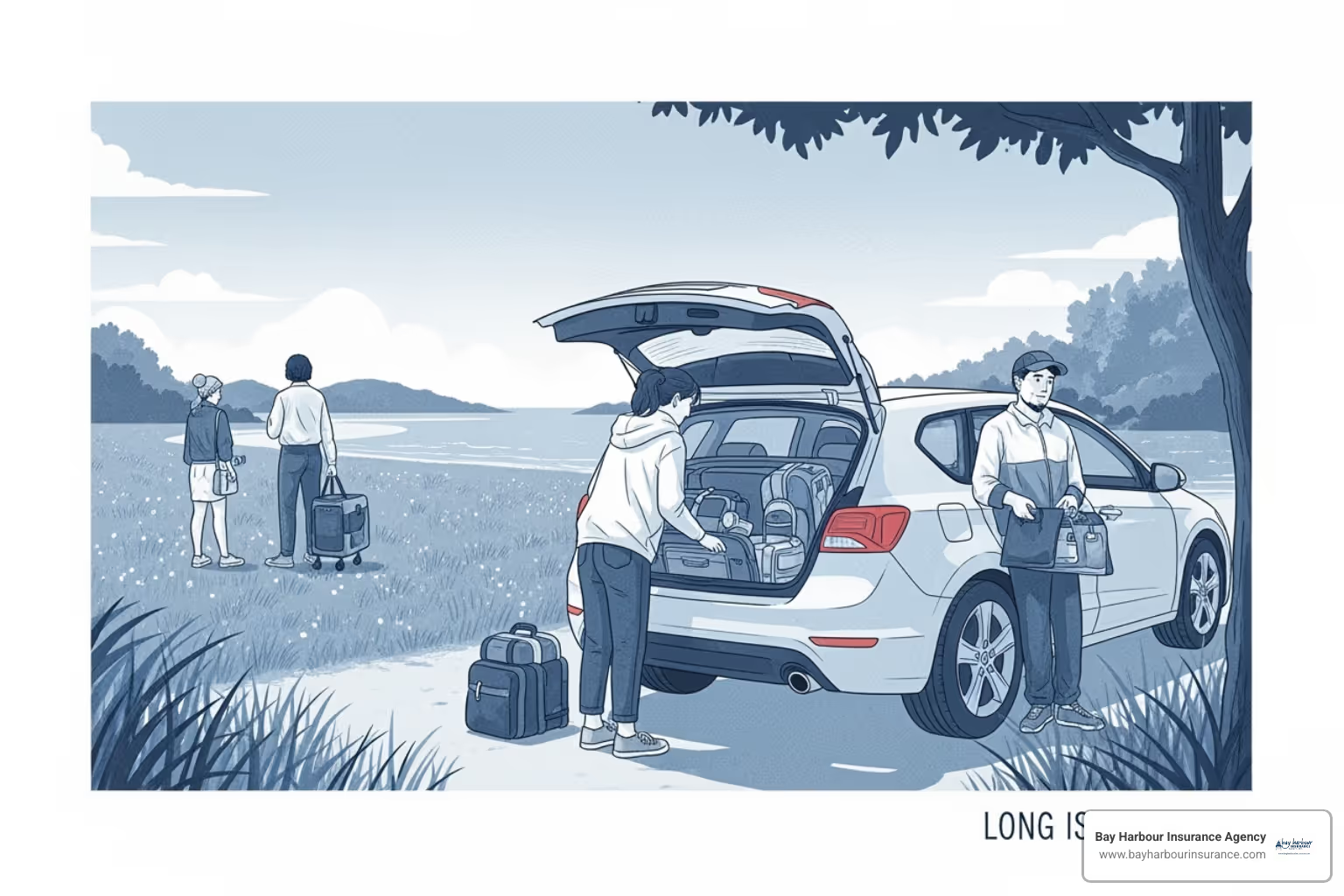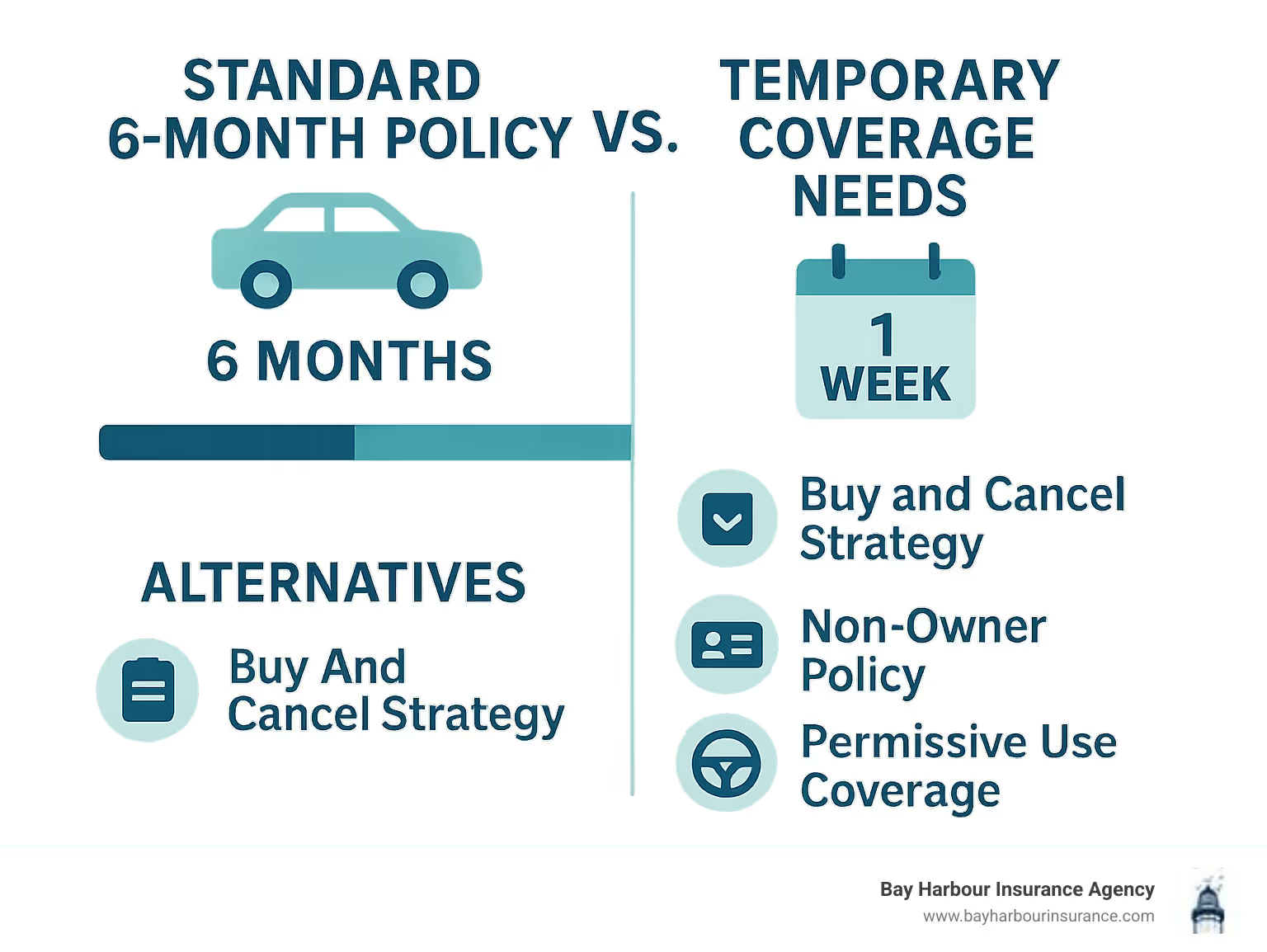
Is One-Week Car Insurance a Myth? Find Your Short-Term Solution
August 22, 2025
The Reality Behind One-Week Car Insurance
Have you ever found yourself needing a car for just a short period? Maybe you're borrowing a friend's car for a weekend getaway, test-driving a potential new vehicle, or have a family member visiting who needs to get around. In these situations, the idea of "one-week car insurance" seems like the perfect solution. However, the reality is that traditional insurance companies in the United States, including those in New York, don't typically offer policies for such short durations. The standard policy term is usually six or twelve months.
But don't worry, that doesn't mean you're out of options. While you can't just buy a policy for a single week, there are several practical and effective strategies to get the temporary coverage you need. These workarounds are designed to ensure you're legally and financially protected without committing to a long-term contract.
Key Takeaways for Short-Term Car Insurance:
- Buy a Standard 6-Month Policy and Cancel Early: This is a common method. You get a prorated refund for the unused portion, but be mindful of potential cancellation fees.
- Non-Owner Car Insurance: An excellent choice if you don't own a car but frequently borrow or rent one. It provides liability coverage for you, regardless of the vehicle you're driving.
- Permissive Use: If you're borrowing a car from a friend or family member, their existing policy may cover you as a permissive user, but this has limitations.
- Rental Car Insurance: When renting from a company, you can purchase insurance directly from them for the duration of the rental.
Navigating insurance can be complex, especially with non-standard needs like short-term coverage. The insurance industry is built on long-term risk assessment, which is why policies shorter than six months are not standard offerings from major carriers. They find it administratively difficult and less profitable to underwrite such short-term risks. However, understanding the alternatives is key. Whether you're a college student home for the holidays in Patchogue or a visitor exploring the beautiful sights of Long Island, we'll guide you through the best ways to stay protected on the road.

Why True One-Week Car Insurance is a Rarity in the U.S.
When we talk about one-week car insurance in the U.S., we're often referring to a strategy rather than a specific, off-the-shelf product. Unlike some international markets where you might find hourly or daily car insurance readily available, the American insurance landscape is primarily structured around longer policy terms—typically six months or a full year. This structure is deeply embedded in how insurance companies assess risk and price their products.
Insurance is a business of risk pooling. Companies calculate premiums based on long-term data and the probability of an incident occurring over a significant period. A one-week policy presents a much higher risk concentration. For example, a driver might only want insurance for a weekend road trip, which involves more driving and potentially higher risk than their usual daily commute. This makes it difficult for insurers to price such a policy accurately and affordably. Furthermore, the administrative costs of setting up and then quickly canceling a policy are often too high to justify for such a short duration. As your local independent agency, we understand the nuances of the U.S. market and how it differs from others. For more insights into how vehicle insurance quotes work in New York, you can explore our resources on More info about NY Vehicle Insurance Quotes Online.
How it Differs from Standard Coverage
The fundamental difference between what someone might imagine as one-week car insurance and a standard policy lies in several key areas:
- Policy Duration: Standard policies are long-term commitments, typically lasting six or twelve months. This provides continuous, uninterrupted coverage. Short-term solutions, on the other hand, are designed to cover specific, limited periods, from a single day to a few weeks.
- Payment Structure: Traditional insurance usually involves a down payment followed by monthly installments. The alternatives for short-term needs, such as pay-per-mile insurance, can offer more flexible payment options that align directly with your usage, sometimes even on a daily basis.
- Flexibility and Purpose: Standard policies are for daily, ongoing use of a vehicle you own. Short-term solutions offer unparalleled flexibility, allowing you to get coverage only for the time you need it. This is ideal for temporary situations where a full-term policy is impractical or unnecessary.
- Cancellation Process: While you can cancel a standard policy at any time, you need to be aware of potential cancellation fees or specific procedures. The strategies for short-term coverage, however, are built around this flexibility, often involving policies designed for easy, pro-rated cancellations without significant penalties.
- Intended Use Cases: Standard policies are for vehicle owners who need continuous, reliable coverage for their daily driving needs. Short-term alternatives are custom for specific, temporary situations, such as borrowing a car, renting a vehicle, or bridging a gap between long-term policies.
Common Scenarios for Needing Short-Term Coverage
Life on Long Island and beyond is full of unexpected twists and turns, and sometimes those twists involve needing a car for just a little while. We've seen countless situations where a traditional, long-term policy just doesn't make sense. Here are some of the most common reasons why our clients look for one-week car insurance or similar short-term solutions:

- Borrowing a Car: Perhaps a relative is visiting Holbrook and needs to use your car for a week, or you're borrowing a friend's vehicle while yours is in the shop. You want to ensure everyone is properly covered without committing to a new annual policy.
- Test Driving a Private Sale: You've found a promising car for sale in Medford, but it's from a private seller, and you need to take it for an extended test drive. You want to be insured during this critical evaluation period.
- Visitors Driving: If you have out-of-town guests staying in Bellport who want to explore Long Island, and they plan to drive your car, temporary coverage might be a smart move.
- Emergency Vehicle Use: Your car breaks down unexpectedly, and you need to borrow a vehicle from a family member for a few days to get to work or handle essential errands.
- Gaps Between Policies: You might be selling one car and buying another, or switching insurance providers, and you need seamless coverage for a brief transitional period to avoid a lapse.
- College Students Home for Break: A student returning to Patchogue from college for spring or summer break might need to drive the family car, but only for a limited time.
- Temporary Work or Gig Economy Driving: If you pick up a short-term gig that requires driving, like temporary deliveries, you'll need to ensure you're adequately insured for that specific use.
These scenarios highlight why flexibility in car insurance is so valuable. While a direct one week car insurance product might be elusive, we're here to help you steer through the alternatives to ensure you're always protected.
Practical Alternatives for Short-Term Insurance
Since a dedicated one-week car insurance policy isn't typically available from major U.S. insurers, we guide our clients through several practical alternatives that can achieve the same goal of short-term coverage. Each option has its own benefits and considerations, and the best choice depends on your specific needs. Understanding these alternatives is key to making an informed decision that provides the right level of protection without unnecessary cost.
| Strategy | Cost Implications | Best Use Case
Buy a Standard Policy, Then Cancel It | You'll pay the initial premium, which might be a down payment for the full term. Upon cancellation, you receive a prorated refund, but be aware of potential cancellation fees that could make this a costly option for just a few days. | Ideal for situations where you need coverage for a few weeks to a month, such as when you're between cars or waiting for a new policy to start. It's a reliable way to ensure you have full coverage.
| Pros: Provides comprehensive coverage options.
Cons: Can be expensive due to cancellation fees and the initial down payment. Requires more administrative effort.
|| Non-Owner Car Insurance | Generally more affordable than a standard policy, with premiums paid monthly or annually. Costs are lower because the insurer assumes you drive less frequently than a car owner. | Perfect for individuals who don't own a car but frequently borrow or rent vehicles. It offers liability protection that follows you, not the car.
| Pros: Cost-effective, flexible, and provides consistent liability coverage.
Cons: Doesn't cover damage to the car you're driving (collision/comprehensive).
| | Rental Car Insurance | Can be purchased directly from the rental company at the counter. Costs are calculated on a daily basis and can be high, but it's convenient for short-term rentals. | Best for when you're renting a car for a few days, like on a vacation or business trip, and your personal auto policy or credit card doesn't offer sufficient coverage.
| Pros: Convenient and easy to obtain at the rental counter.
Cons: Can be expensive, and the coverage might have limitations.
| | Permissive Use | No direct cost to the borrower, as it relies on the car owner's existing insurance policy. However, an accident could raise the owner's premiums. | Suitable for very short, infrequent use of a friend's or family member's car, like running a quick errand.
| Pros: No cost to the borrower.
Cons: Coverage limits may be lower for permissive users, and it can strain personal relationships if an accident occurs. Not intended for regular use. |
Buy a Standard Policy, Then Cancel It
One of the most straightforward, albeit sometimes costly, ways to get temporary car insurance is to purchase a standard six-month policy and then cancel it once you no longer need it. Most insurance companies are legally required to refund you for the unused portion of your premium, a process known as pro-rating. For example, if you pay for a six-month policy but cancel it after one month, you should receive a refund for the remaining five months.
However, it's crucial to be aware of potential cancellation fees. Some insurers charge a fee for early termination, which can eat into your refund. Before you commit, always read the policy's terms and conditions or speak directly with an agent to understand the cancellation process and any associated costs. This method is often best suited for situations where you need coverage for a month or two, rather than just a single week, to make it financially worthwhile. Keeping detailed records of your policy start and end dates, as well as any communication with the insurance company, is also a good practice.
Purchase a Non-Owner Car Insurance Policy
If you don't own a vehicle but find yourself frequently borrowing or renting one, a non-owner car insurance policy is an excellent option. This type of policy provides liability coverage for bodily injury and property damage you might cause while driving a car you don't own. It acts as secondary coverage, kicking in after the car owner's primary insurance is exhausted, or as primary coverage if the owner has no insurance.
Non-owner policies are typically more affordable than standard auto insurance because the insurer assumes you're driving less often. This makes it a cost-effective way to ensure you're always covered, no matter whose car you're behind the wheel of. It's particularly useful for city dwellers who rely on car-sharing services or borrow cars from friends for weekend trips. However, that non-owner insurance usually doesn't include collision or comprehensive coverage, meaning it won't pay for damage to the car you're driving. For that, you'd need to rely on the car owner's policy or a separate rental car insurance policy.
Rely on the Car Owner's "Permissive Use" Clause

In many cases, if you're just borrowing a friend's or family member's car for a short, infrequent trip, you may be covered under their existing auto insurance policy. This is thanks to the "permissive use" clause, which extends the owner's coverage to anyone they give permission to drive their vehicle. It's a simple, no-cost solution for very short-term needs, like running an errand or a quick trip to the store.
However, relying solely on permissive use has its limitations and risks. Firstly, the coverage limits are determined by the owner's policy, which might not be sufficient for your needs. Secondly, if you get into an accident, the claim goes on the owner's record, which could lead to increased premiums for them. This can strain personal relationships. It's also important to note that permissive use is intended for occasional, infrequent use. If you're driving the car regularly, you should be added as a named driver to the policy. Before you get behind the wheel, it's always a good idea to confirm the details of the owner's policy and understand the extent of the coverage. For a deeper understanding of insurance terminology, the Insurance Information Institute is a great resource.
Contact Bay Harbour Insurance Agency in Patchogue, NY for a Long Island auto insurance quote.

